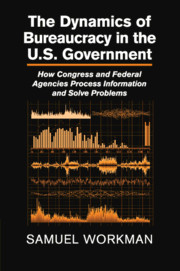Crossref Citations
This Book has been
cited by the following publications. This list is generated based on data provided by Crossref.
Workman, Samuel
and
Shafran, JoBeth S.
2015.
Policy Paradigms in Theory and Practice.
p.
239.
Carlson, Deven E.
Ripberger, Joseph T.
Jenkins-Smith, Hank C.
Silva, Carol L.
Gupta, Kuhika
Berrens, Robert P.
and
Jones, Benjamin A.
2016.
Contingent Valuation and the Policymaking Process: An Application to Used Nuclear Fuel in the United States.
Journal of Benefit-Cost Analysis,
Vol. 7,
Issue. 3,
p.
459.
Wilkerson, John
and
Casas, Andreu
2017.
Large-Scale Computerized Text Analysis in Political Science: Opportunities and Challenges.
Annual Review of Political Science,
Vol. 20,
Issue. 1,
p.
529.
Bauer, Michael W.
Knill, Christoph
and
Eckhard, Steffen
2017.
International Bureaucracy.
p.
179.
Weible, Christopher M.
and
Carter, David P.
2017.
Advancing Policy Process Research at Its Overlap with Public Management Scholarship and Nonprofit and Voluntary Action Studies.
Policy Studies Journal,
Vol. 45,
Issue. 1,
p.
22.
Jörgens, Helge
Kolleck, Nina
Saerbeck, Barbara
and
Well, Mareike
2017.
International Bureaucracy.
p.
73.
Rudalevige, Andrew
2018.
Beyond Structure and Process: The Early Institutionalization of Regulatory Review.
Journal of Policy History,
Vol. 30,
Issue. 4,
p.
577.
Baekgaard, Martin
Mortensen, Peter B
and
Bech Seeberg, Henrik
2018.
The Bureaucracy and the Policy Agenda.
Journal of Public Administration Research and Theory,
Vol. 28,
Issue. 2,
p.
239.
Chan, Kwan Nok
and
Lam, Wai Fung
2018.
Bureaucratic control and information processing: An institutional comparison.
Governance,
Vol. 31,
Issue. 3,
p.
575.
Carrigan, Christopher
2018.
Unpacking the Effects of Competing Mandates on Agency Performance.
Public Administration Review,
Vol. 78,
Issue. 5,
p.
669.
Denny, Matthew
2018.
More than Control: Partisan Differences in the Use of Statutory Constraints on the Bureaucracy.
SSRN Electronic Journal ,
Fagan, E. J.
2018.
Marching Orders? U.S. Party Platforms and Legislative Agenda Setting 1948–2014.
Political Research Quarterly,
Vol. 71,
Issue. 4,
p.
949.
Bradley, Katharine W. V.
and
Haselswerdt, Jake
2018.
Who lobbies the lobbyists? State Medicaid bureaucrats’ engagement in the legislative process.
Journal of Public Policy,
Vol. 38,
Issue. 1,
p.
83.
Kosti, Nir
and
Levi‐Faur, David
2019.
The Coproduction of Primary and Secondary Legislation: Israel as a Case Study of Substitutive Relationships.
Law & Policy,
Vol. 41,
Issue. 4,
p.
432.
Jones, Bryan D.
Epp, Derek A.
and
Baumgartner, Frank R.
2019.
Democracy, Authoritarianism, and Policy Punctuations.
International Review of Public Policy,
Vol. 1,
Issue. 1,
p.
7.
Bevan, Shaun
Jennings, Will
and
Pickup, Mark
2019.
Problem detection in legislative oversight: an analysis of legislative committee agendas in the UK and US.
Journal of European Public Policy,
Vol. 26,
Issue. 10,
p.
1560.
Carlson, Deven
Ripberger, Joseph
Wehde, Wesley
Jenkins-Smith, Hank
Silva, Carol
Gupta, Kuhika
Jones, Benjamin
and
Berrens, Robert
2019.
Benefit-Cost Analysis, Policy Impacts, and Congressional Hearings.
Journal of Benefit-Cost Analysis,
Vol. 10,
Issue. 1,
p.
65.
Mishra, Santap Sanhari
2019.
Global Encyclopedia of Public Administration, Public Policy, and Governance.
p.
1.
Vogler, Jan P.
2019.
The Entanglement of Public Bureaucratic Institutions: Their Interactions with Society, Culture, Politics, and the Economy.
SSRN Electronic Journal ,
Bark, Tracey
and
Bell, Elizabeth
2019.
Issue Prioritization by Bureaucratic Leaders: The Influence of Institutional Structure.
Administration & Society,
Vol. 51,
Issue. 6,
p.
915.





